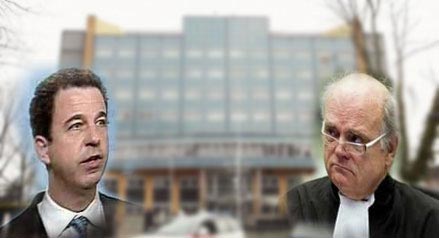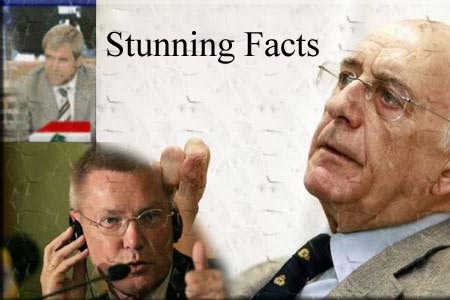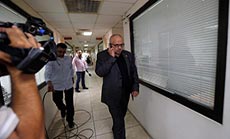New Attempts Evading STL Non-Constitutionalism

Some others consider that Lebanon has nothing to do with the extension due, which must take place outside Lebanon.
1. What is the source of establishment of the STL: the underhand agreement the government has made with the UN or the UN Security Council Resolution 1757?
2. To what extent is the date of the protocol end related to determining the STL's fate? Is it discussable or not?
3. Who is supposed to make the extension: the government, the UN, or the UNSC?
4. Who is responsible for conducting consultations with the UN and the UNSC: the government or President Suleiman?
5. What is the Lebanese government's role in renewing the protocol? Is the opinion the government makes during the consultations requisite or merely consultative? In other words, are the consultations requisite or not?
6. Are the consultations bounded by the agreement duration or does the STL extension bring about the issue of redirection and error correction or cancellation?
7. Does Lebanon have the right to adjust the STL protocol? How does adjustment differ from correction?
8. In case the government refuses the extension while the UN insists on it, how will this be settled?
1- Desperately attempting to evade the requests of the legal opinions concerning
The opinion says that the STL has been established according to the UNSC Resolution 1757 rather than an agreement with the Lebanese government.
The opinion adds that Resolution 1757 has made the STL executable after certain constitutional obstacles had obstructed its ratification through negotiations between the UN and the illegitimate government as the STL had been facing certain constitutional obstacles.
Nevertheless, these frail allegations can't be accredited, but rather they can be easily refuted. This comes especially when they mean that - in a way or another - the STL has been established according to the UNSC Resolution 1757 under the Seventh Chapter, making it appear to be, therefore, an international resolution.
The information aforementioned reveals that Resolution 1757 states the declaration on the STL and the beginning of its functioning - not its establishment, which has been established upon the agreement the Lebanese government made with the UN.
2- The STL's patronage is limited to a certain period of time (three years). Thus, it is generally distinguished from the permanent tribunals like the International Forensic Tribunal, particularly when the STL is supposed to handle only the crime of Hariri's assassination and some other specified crimes.
Hereupon, the end of the period of the STL's patronage does require discussion on it so as to evaluate its recent-three-year experiment regarding the STL's commitment to the standards of international justice, as well as regarding other criteria; then, we can realize the truth and fill the gaps resulting from the STL's countless illegalities in order to maintain justice.
At least, the STL's non-constitutional establishment (the procedural and constitutional endorsement) must be corrected. Also, the case of the false witnesses and its repercussions - the political accusations against innocent figures that haven't been paid recompense so far - must be treated.
As long as the source of the STL's establishment, as we've seen, is the protocol agreement signed by the illegitimate Lebanese government and the UN entitled "UN-Lebanese Government Agreement on Establishing STL", the extension can only take place upon the will of both parties rather than a single one; solely adjusting some standards of this agreement under a resolution that is requisite for the other party, otherwise, the UN will have acted against the principle of the contractors' bill.
It is known that upon the principle of contracts relativity, agreements do not bring about any negative or positive outcomes for parties uninvolved in the contract.
In conclusion for all information mentioned so far, the Lebanese government and the UN are in charge of the extension, unlike the UNSC that has nothing to do at all with this extension or the agreement signed by both parties.
3- Constitutionally, the government's will manifested to the outside world is legally expressed by the president; this is actually stated by Material 52 of the Constitution, whereby it gives the president the authority over running negotiations as international agreements are made, which the negotiations on the STL establishment did not comply with.
Furthermore, Material 52 of the Constitution gives the president the authority over endorsing the STL agreement upon the agreement of the president with the premier and the entire Ministerial Council, as well as the authority over issuing and publishing the agreement under a republican decree after the Ministerial Council ratifies it (since it includes financial commitments).
Now, it is clear that according to the Constitutional text, the president is in charge of direct negotiations on establishing, adjusting, correcting, extending the work period, or any other thing related to the STL protocol.
4- The protocol signed by the illegitimate Siniora government and the UN was not incidental but rather the outcome of negotiations and consultations held in January 2006 through September 2006 at the UN Headquarters in New York, in Lahai, and in Beirut by the UN legal counselor as well as by the Lebanese-government representatives according to the text of Resolution 1757 itself.
Even though this agreement is constitutionally underhanded, it includes - in a way or another - commitments exchanged by its parties, whereby the protocol standards state these commitments.
We conclude that the Lebanese government's consultation with the UN regarding the extension for the Tribunal's work is an essential and basic matter; it is even compulsory: The UN secretary general mustn't overcome it or act in a contradicting manner since it is stated in the protocol text and since it is a clear commitment the secretary general must make in return for counter commitments.
5- The Lebanese government's consultation with the UN is not limited to the agreement period (three years).
7- A clear text of the STL establishment protocol allows Lebanon to request that the agreement signed with the UN be adjusted; whereby Material 20 of the protocol states: "This agreement is adjustable upon a written agreement between both parties."
Now that the text is absolutely clear, it must not be misinterpreted. As for the request concerning the agreement adjustment, it remains a basic right for Lebanon, and none can deprive Lebanon of it.
There is one more basic matter: What if the outcome of the required consultation of the Lebanese government with the UN is two contradictory opinions, as in the case of Lebanon's clinginess to adjusting the non-constitutional course of the Tribunal in contrast with the UN secretary general's clinginess to extending its work for a certain time period without regarding any of Lebanon's remarks?
Well, Material 18 of the Tribunal protocol is decisive as it points out the way to settle any conflicts between both parties, stating: "Any conflict between both parties concerning the explanation or application of this agreement is to be settled through negotiations or any other settlement method which both parties agree on."
So this text reveals that negotiations can resolve any conflicts between the protocol parties regarding the explanation or application of the protocol; in case this does not happen, several other ways, as arbitration, are applicable, and this introduces reaching a settlement concerning both parties' conflicts (the Lebanese government and the UN).
In conclusion, the information aforementioned reveals that extending the STL's work requires consultations with the Lebanese government's approval preceded by consultations with it; no extension can be made unless both parties reach an agreement on this.
Source: Al-Intiqad Online Newspaper, Translated and Edited by moqawama.org
Two months ago, the funding of the Special Tribunal for Lebanon (STL) was decided underhand.
Now the STL shows up again upon the extension of its protocol, which, too, was established underhand three years ago by the illegitimate PM Siniora government; whereby this protocol was neither established nor ratified in accordance with the constitution and the functional constitutional procedures:
The president did not sign it; the Ministerial Council did not approve of it; and the Parliament did not ratify it.

By the end of this month, the Tribunal's patronage will have ended; hereupon, international "concern" for Lebanon has been manifested through the consecutive visits of the United Nations Secretary General Ban Ki Moon and the officers in charge of the STL to Beirut.
This concurs with the reappearance of local conflicts after a no-more-than-two-months "warrior rest"; whereby some have commenced promoting improper concepts and explanations regarding the STL protocol, particularly regarding the standards stating extension.
Some see that the STL protocol is not discussable since the STL has been established under the UN Resolution 1757 rather than the agreement which the illegitimate government has made with the United Nations, and this makes the agreement rules "valid and executable".
Still, others see that Lebanon can provide a consultation concerning the period of time Lebanon is supposed to allow the STL extension; that is, it is required that an agreement be made on the extra commissioning period only for the STL.
Encountering this reality, placing things where they should be, and preventing the occurring confusion upon the declarations of some "media geniuses" and new "sharp law-makers", we offer a scientific refute in regard to the entire declarations made in order to answer all legal questions and controversies aroused by the issue of the STL protocol extension.
the non-constitutionalism of the STL funding after their failure to refute this fact, some have recently come up with a new "genius" opinion in an attempt to provide a better image of the STL, which has suffered repercussions.

And this absolutely contradicts with what Resolution 1757 has pointed out as it has described the STL as "a Tribunal of an international character".
(Paragraph 4 of the preliminaries of Resolution 1757 has pointed out this name for the Tribunal; whereby it points out the letter the Lebanese premier had sent to the UN secretary general on the 13th of December, 2005 in regard to establishing a tribunal of international character.)
Besides, the International-Law principles usually do not allow states to impose agreements through a requisite UN resolution according to the Seventh Chapter.
Furthermore, legal concepts are terribly confused; even the simplest legal principles and criteria are misunderstood, and the purpose beyond this is to distort the facts and blind people.
So how can a resolution endorse an agreement executable, particularly when it's known that usually a resolution is issued upon a unilateral will and is requisite and obligatory?
As for an agreement, it requires the compliance of two wills or more, as well as a proposal maker and an acceptor so as to become requisite.
Thereon, it must be defined whether the STL has been established according to a UN international resolution or according to an agreement between the illegitimate government and the UN; there mustn't be any confusion concerning this.
Besides, the text of the UNSC Resolution 1757 is based upon confirming that the assassination of the former Lebanese Premier Rafik Hariri is "a terroristic act".
As well, the text points out that "the corresponding outcomes threaten international peace and security", according to which, also according to the Seventh Chapter of the UN Charter, the text contains three paragraphs concerning definite dates and times.
(Paragraph (1) contains the validation date of the STL protocol; paragraph (2) contains the date of commencing the Tribunal's work; paragraph (3) emphasizes the necessity of making the required steps to establish the Tribunal soon.)
The UN Resolution 1757, issued under the Seventh Chapter, mentions an agreement between both parties: the Lebanese Republic and the UN.
Therefore, it is supposed that this agreement is legally and theoretically requisite for these parties only; that is, this agreement has nothing to do with any other parties or states, and the UNSC has nothing to do with it after its endorsement.
As well, the ones responsible for leading the international investigations astray from their right course must be punished, etc...
Thereon, the UNSC is not a party involved in the Lebanese government's agreement with the UN, so it doesn't correspond to this agreement or any of its standards, nor with the extension for the STL.
Besides, in accordance with the logic upon which it has been issued, the UNSC Resolution 1757 points out that it only corresponds to the beginning of the protocol validity and the beginning of the Tribunal's work upon the basis of describing the crime as "a terrorist act that threatens international peace and security - a condition unavailable in the current Lebanese circumstances."
Hence, so as to abide by the principles governing its work, the UNSC has no excuse to intervene today - neither under the Sixth Chapter nor the Seventh Chapter.
So since the illegitimate Siniora government then took charge of holding negotiations on the treaty of establishing the Tribunal and endorsing and signing it without abiding by the Constitutional fundaments, any further incompliance with the president's authority will today be considered contradictory with the Constitution and the Lebanese internal laws, and it will make the extension illegal and unconstitutional.

Afterwards, both parties signed the protocol. (Paragraph (7) of the preliminaries of Resolution 1757 states the endorsing of an agreement by the Lebanese government and the UN concerning the establishment of "a Special Tribunal for Lebanon"; the Lebanese government signed the agreement on 23 January, 2006 and the UN on 6 February, 2007.)
For instance, here is the text of one of the materials: Three years after the beginning of the STL, both parties, in consultation with the UNSC, display the progress of the STL's works.
In case the Tribunal's activities are incomplete by the end of the three-year period, the agreement is to be extended so as to allow the Tribunal to carry out its work. Extension is to be for an extra time period (or for extra periods), and this is to be determined by the UN secretary general in consultation with the government and the UNSC."
The protocol for establishing the Tribunal has mentioned several matters, emphasizing the necessity of both parties' consultation as in the case of assigning the judges, the prosecutor general (whose patronage period is three years), and the deputy prosecutor general, in addition to establishing the administration committee...
And this matter is obvious as long as the agreement is based on two different volitions, none of which can dominate the other.
Thereon, the agreement extension due brings about an essential and extremely important matter: correcting the inconvenient and unconstitutional condition which has clandestinely been established, overcoming the Lebanese State and its constitution through simplifying and confiscating the president's and the Parliament's authorities.
All this has been done by a government that is illegitimate in the first place.
The other choice is to request that the STL be cancelled, and this is a basic right that the Lebanese government can claim in accordance with the requirements of the commonweal.
As for correction, it is supposed to include all of the previous constitutional gaps; for example, the president can be commissioned for the STL establishment protocol and asked to sign it.
Another choice is to allow the procedural making (which needs the votes of two-thirds of the Ministerial Council) and the constitutional making (since the agreement includes financial commitments that can't be renounced year after another), then signing them and publishing them in the official newspaper.
In fact, Lebanon can use this right any time it decides is convenient so as to maintain the Lebanese interest - whether an extension is due or not.
Yet, the matter we're handling here is much bigger as it is a case of correcting an improper condition and course, and this requires many steps in order to get accomplished.
It is not a matter of merely adjusting a standard or more of the protocol; that is, the correction demands that things be returned where they belong and be made clear through ridding the Tribunal and its course of the characters of non-constitutionalism and illegitimacy; also through correcting its defect by handling many matters as those of the false witnesses and of the political accusation, and others...




